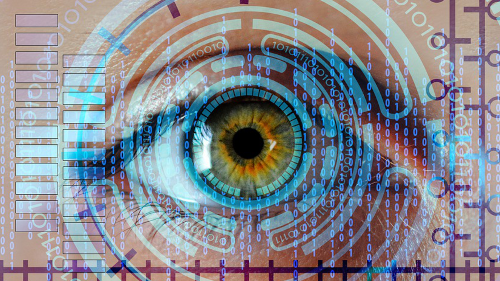Posts Tagged ‘Technological Symbiosis’
UK Microchip Implant Firm Now Providing Credit/Debit Payments. Technology Can Only Go So Far Before Prophecy Intervenes.
Hand swipe payments have been taken to the next level by a British microchip implant business, raising concerns about end times prophesies. Human implantable microchips have gone a long way since the first one was implanted in 1998. The technology became commercially accessible in the recent decade, allowing enabling hand swipe credit card payments. Anyone with a microchip implant may use their credit card to pay for anything by just placing their hand with the chip close to the scanner, and the payment will be completed. According to the BBC, Walletmor, a British-Polish company, made this technology accessible for purchase in 2021. The microchip implant may be used to pay for any transaction “anywhere contactless payments are accepted,” according to Wojtek Paprota, the company’s founder and CEO. The microchip implant developed by Walletmor is so small and light that it weighs…
Read MoreBiden Is Paving The Way For A Federally Owned Digital Currency Via Executive Order.
President Joe Biden is expected to sign an executive order on Thursday that would look into the possibility of creating a digital currency issued by the US Central Bank (CBDC). Unlike cryptocurrencies like bitcoin, which are not controlled by a single body, this is a digital currency that would be issued by a central bank like the Federal Reserve. The executive order also calls for more research to be conducted in the coming months, as well as policy suggestions from the Treasury Department and other government agencies on how to manage the rapidly growing digital currency sector. According to a White House statement, “the United States must continue technological leadership in this fast emerging field, promoting innovation while minimizing risks for consumers, businesses, the broader financial system, and the climate.” In November, the market capitalization of cryptocurrencies surpassed $3 trillion.…
Read MorePrivate Data Leaks Occurring All Over The Internet According To A Recent University Study.
According to a May 12 article in Fortune, researchers from KU Leuven, Radboud University, and the University of Lausanne conducted a study and discovered that tens of thousands of websites captured—without permission—every word typed into an online form, even if users left the site without submitting their information. “Given its scope, intrusiveness, and unexpected consequences,” the study’s authors said, “the privacy problem we analyze warrants additional attention from browser makers, privacy tool developers, and data protection organizations.” While typing out their email address on a website, establishing an account, purchasing a ticket, or subscribing to a newsletter, many people were mistakenly made to believe that their personal data was safe. According to Fortune, the combined university research looked at over 100,000 websites. The study teams constructed fictitious software profiles that imitated a real user who visited hundreds of websites and…
Read MoreCanadian Mounted Police Are Getting Away With Misusing AI powered Facial Recognition Technology.
The federal government is seeking a court to deny a Quebec photographer’s request for certification of a class-action lawsuit over the RCMP’s use of a controversial facial-recognition program, which might affect millions of people. Government attorneys argue in a filing to the Federal Court that Ha Vi Doan cannot claim “damage of any type” as a result of the national police force’s contacts with Clearview AI. Doan’s planned class-action complaint seeks unspecified damages on behalf of herself and other Canadians whose images and information were allegedly included in a vast database collected by Clearview AI and utilized by the Mounties under license. Clearview AI’s technology has drawn a lot of attention since it involves gathering large quantities of photographs from diverse sources with the goal of assisting police forces, financial organizations, and other clients in identifying people from photos. The…
Read MoreUK Permits Facial Recognition Tech To Be Used On Innocent Persons Who “May Be In Danger”. Welcome To 1984.
New UK police guidance that could put innocent people on facial recognition system watchlists has been slammed by civil rights groups. On Tuesday, the College of Policing released a handbook for police in England and Wales, claiming that the use of live face recognition technology is “legal and ethical.” Face recognition technology can be used to discover “those who are missing and possibly in danger; find people where intelligence suggests they may represent a threat to themselves or others; and arrest people who are wanted by police or courts,” according to authorities. The guidance, however, is a “atrocious policy and a hammer blow to privacy and liberty in our country,” according to Silkie Carlo, director of the privacy campaign group Big Brother Watch. “With this Orwellian surveillance technology, we warned about mission creep, and now we see that this new…
Read MoreGovernment-Wide Facial Recognition Software Usage is Under the Microscope.
Following the success of a recent effort to have the Internal Revenue Service (IRS) scrap its facial recognition program, privacy advocates are now targeting other agencies that employ the technology. Public interest groups and legislators from both parties reacted angrily to reports last month that the IRS required people to upload selfies for an identity verification program managed by ID.me. Sen. Ron Wyden (D-Ore.) called on the IRS to end the program, while Sen. Roy Blunt (R-Mo.) sought a blanket prohibition on the IRS collecting biometric data. The Electronic Privacy Information Center (EPIC) and the Media Alliance have joined the chorus of public interest groups calling for the IRS to abandon its plan. Their advertising was a big hit. The IRS announced on February 7 that it will not utilize a third-party business to use face recognition to authenticate new…
Read MoreChina Wants Your DNA Sequencing Data. They May Already Have it.
According to Edward You, the US national counterintelligence officer for Emerging and Disruptive Technologies, China is “developing the world’s largest bio database.” “It’s not something you can change like a pin code once they have access to your genetic data.” The Chinese Communist Party (CCP) is compiling a large database of medical, health, and genetic information from people all over the world, including Americans, in order to dominate the bioeconomy. Private firms are enlisted by the CCP to assist in the collection of genetic data, which may then be merged with top military supercomputing capabilities to uncover genetic flaws in a population. Bioweapons that feed on these flaws can then be designed. Chinese scientists have been pursuing research in the areas of brain science, gene editing, and the construction of artificial genomes as part of Beijing’s military-civil fusion program. Similar study…
Read MoreCrysler Announces Ambitions to Go All Electric By 2028. Software is Going to be Everywhere.
Chrysler has announced ambitions to go totally electric by 2028, with the first electric vehicle expected to hit the market in 2025. According to The Associated Press, Chrysler announced the plans alongside a new AI-enabled vehicle system powered by a battery that the company claims can drive 350 to 400 miles on a single charge. Chrysler is part of Stellantis, a European automaker that revealed last month a new goal to integrate AI-enabled software into millions of vehicles across its 14 brands. By 2030, Stellantis might earn $22.6 billion in annual income as a result of this. This is all part of the push between automakers to deliver more fully electric and hybrid vehicles with more autonomous driving capabilities. Overall, this would signal a shift away from gasoline-powered engines in automobiles. Chrysler, as one of Stellantis’ primary American brands, will…
Read MoreArizona Companies Stoking the Fires of Innovation with Successful Driverless Semi-Truck Test Drive on Open Roads.
On Dec. 22, a long-distance test of a driverless big-rig truck cab in Arizona went off without a hitch, marking the first live demonstration of a completely autonomous long-haul vehicle on public roads in the world. TuSimple Holdings stated on Dec. 29 that the specifically upgraded Class 8 semi-truck has completed an 80-mile test run without the presence of a human. “By achieving this momentous technical milestone, we demonstrated the advanced capabilities of TuSimple’s autonomous driving system and the commercial maturity of our testing process, prioritizing safety and collaboration every step of the way,” said Cheng Lu, president and CEO of TuSimple, a San Diego-based autonomous driving technology company. The test, according to Lu, “reinforces what we believe is our unique position at the forefront of autonomous trucking, delivering advanced driving technology at commercial scale.” “This year we were laser-focused on…
Read MoreKlaus Schwab’s Map to the Great Reset.
“The pandemic represents a rare but narrow window of opportunity to reflect, reimagine, and reset our world.” Klaus Schwab, Founder and Executive Chairman, World Economic Forum The world economic forum most certainly does not have our best interest in mind, and plans to take advantage of the “window of opportunity” that the plandemic has provided for them. Above is a graph made by Klaus with seven points revolving around the goal. The Great Reset. These seven points are in question: Strengthening Regional Development. Revitalizing Global Cooperation. Developing Sustainable Business Models. Restoring the Health of the Environment. Redesigning Social Contracts, Skills and Jobs. Shaping the Economic Recovery. Harnessing the 4th Industrial Revolution. As profoundly vague as some of these points are, that’s good for Klaus. Because that means he can make up the rules as he goes. With broad strokes of…
Read More







